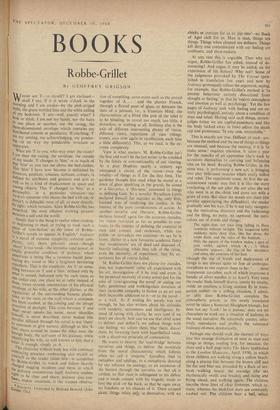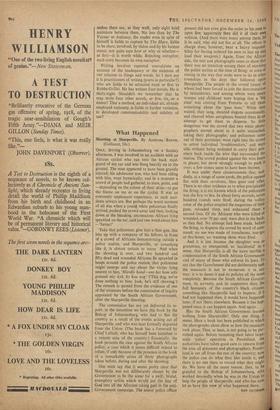BOOKS
R obbe-Grillet
By GEOFFREY GRIGSON
W HERE am shall I say, if it is seven o'clock in the 'I'—to myself? I m enclosed— shall and I am awake—by the pink-striped walls, the green mottled lino and the white ceiling ial my bedroom. T am—well, exactly what? I look or think, I am not my hands, nor the hairs in one place or another, nor the casing, the three-dimensional envelope which contains my distributed content or peculiarity. If anything, T 1111 my sensing, my acknowledging, my ponder- 'ag—in no way my ponderable structure or apparatus.
What am 'I to you, who may enter the room'? am then the casing, the envelope, the outside 1_f my inside. T changes to 'him,' or as much of 'him' its you can see above the bed-clothes. _,`,his 'him' 1 have now become is delimited by distances, position, volumes, surfaces, colours, is defined by attributes and gestures and acts as well as by a kind of displacement in space and aMong objects. This 'I' changed to 'him,' as a Personality, in a particular situation—say (1,-vis someone who shares the bed with me, or °Lnesn't, is definable most of all, or most directly. °Y sight; which remains, Alain Robbc-Grillet has remarked, 'the- most efficient working process' between a self and the world.
Simply that is the thing to realise when reading. °I' beginning to read, or trying to read, such a Piece of 'anti-fiction' as the latest of Robbe- 9rillet's novels to appear in English.* Ject/ou.sy is a novel of extreme simplicity, extreme corn- PirexitY, very short, precisely about—though ‘400111' is too weak---the immense total power, or 1°tallY powerful condition, of jealousy, which Penetrates a being like a resinous liquid pene- trating dry wood or like a luminous devouring InYeelium. That is the simplicity. An `I,' or son-m- illing between an T and a 'him,' defined only by What is sensed, indicated only by such items as ?ne coffee cup, one place set at table instead of three. stares around, unconscious of his physical enveione, at his wife, at the other planter, at the regularities of the surrounding banana planta- r,,s, at the stain on the wall .where a centipede
as been crushed, at the coming and the abrupt
e,,e,ssation of daylight. This cross between 'I' and klt,InV never speaks his name, never identifies ""self, is never described, never bodied (the ,°"velist diffused through his novel is not 'there' comment or give names), although as this 'I- 5 tar around he names the other man. the :_?reign body, the activator of his jealousy, while
:nentifying his wife, so well known to him that a letter is enough, simply as A. . . .
_ This charitcter without body but with continual entbracing presence---embracing also ms self or
Ybourseif as the reader inside- him- is compelled
eY RObbe-Grillet to watch and follow heavily rharged nagging incidents and items in which e jealousy concentrates itself. jealousy enables 8ht to be clear and sharp, jealousy also con- r es, makes uncertain is the wttrped cald', I ranslated 1)) Richard Howard. (John
tion of something, some event such as the arrival together of A . . . and the planter Franck, through a flawed pane of glass, or between the slats of a jalousie, i.e., a Venetian blind; the characteristic of a blind (the pun of the title) is to be blinding, to reveal too much, too little, a distortion, or nothing at all. Jealousy also is the axis of different intersecting planes of vision, different views, repetitions of view (things, events, seen over again • in recollection, each time a little differently). This, as we read, is the ex- treme complexity.
. View is what matters. M. Robbe-Grillet isn't the first and won't be the last writer to be troubled by the falsity or conventionality of our viewing. As a poet • Hopkins nearly a century ago attempted a clarity of • the vision—even the totality—of things as if for the first time. The gardener thought him mad when he stared at a piece of glass sparkling in the gravel; he aimed at a it/vet:vitas, a 'this-ness,' interested in things as defining God. As a novelist W■ ndham Lew is declared himself for outsides as the only firm. focused way of rendering the insides, in the interest of the pure conseiousness of action. As another novelist and liberator, Robbe-Grillet declares himself again for the accurate outsides, for vision restricted as far as possible to con- tours, in the interest of defining the essential in men and women; and reviewers, while too polite--or nowadays too cautious—to say he is loony, shelter in a now favourite academic fancy that 'modernisms' are all dead and disposed of, heavily indicating, while they talk of the virtue. even the necessity, of experiment, that his ex- periment has of course failed.
M. Robbe-Grillet does not plump for outsides, does not 'experiment' (after all, experiment with his art, investigation of it by trial and error, is the perpetual necessity of every artist) just for the sake of 'reinvigorating the -novel' or curing our lady, gentleman and working-class novelists of their incurable antipathy to fiction as an art and their incurable addiction to it—or to the novel-- as a trick. As. if writing his novels was not enough, he has also written about his attitudes with modesty, seriousness and intelligence. -In- stead of seeing with clarity, he says (and if we don't see clearly, how can we use that chief sense to delimit and define?), we suffuse things with our feeling; we soften them, blur them, distort them, by investing them with hypothetical souls, with a disastrous principle of communion.
He v, ants to destroy the 'soul-bridge' between oursel\ es and things, to deliver the mountain from the moral -characteristic which follows
when we call it 'majestic.' Goodbye then to metaphor and analogy, to a metaphysic denoted by our reliance on analogy, to an extension of the human through the universe, so that all is unified, so that man is subjugated to his defeat and is made content with his tragedy, made to love the stick on his back, so that he signs away his freedom, or his chances of it. 'Once scraped clean, things relate only to themselves, with no chinks or crevices for us to slip into'—no Rock of Ages cleft for us. Man is man, things are things. Things when cleaned are definers. Things left dirty and contaniinated with our feeling are confusers, and slave-makers.
At any rate this is arguable. Then why not argue, Robbe-Grillet has asked, instead of de- nouncing? And argue, it may be added, on the experience of his fiction? Why not? Some of the judgments provoked by The Voyeur (pub- lished in translation last year) and now by Jealousy grotesquely refuse the argument, saying, for example, that Robbe-Grillet's method is `to present behaviour entirely dissociated from thought or feeling,' or that he 'rejects atmosphere and emotion as well as psychology.' Yet the few pages of Jealousy reek with feeling and are en- tirely psychological, entirely about a•condition of man and mind. Having said such things, review- judges (since we are capital-punishers, and like the body tucked away in lime) adjust the death cap and pronounce, 'In any case, unreadable.'
That is exactly not true. Difficult to read—yes, because the method and the use of things as things are unusual, and -because the reading, if it is 'to make sense,' requires attention. It takes a year for the muscles of an apprentice tiler's neck to accustom themselves to carrying and balancing tiles on his head. Reading Robbe-Grillet, in the same way, is performing a new act, is bringing into play little-used muscles which easily stiffen and rebel. The repetitions come. At first the un- accustomed reader may feel it is like the story everlasting of the ant after the ant after the ant who went in at the chink and came out with a grain of corn. But since the novels are short (the novelist appreciating the difficulties), the reader gradually sees his way, if he is not lazy, recognis- ing the meticulous structure and the fashioning and the filing, no putty, no sapwood; the meti- culous use of words and things: The night,does not take long falling in these countries without twilight. The lacquered table suddenly turns deep blue, like her dress, the white floor, and the sides of the bathtub. . . . Only the square of the window makes a spot of pale violet, against which A . . .'s black silhouette appears: the line of her shoulders and arms, the contours of her hair. . . .
(though the use of Words and deployment of things is not always quite so free of anthropo- morphism as one expects them to be: '. . three transparent ice-cubes, each of which imprisons a bundle of silver needles in its heart). Very soon the reader finds himself drawn, tensity by tensity, inside an emotion, a living sentient fly in trans- parent amber--in a stifling situation, I admit, so ably does Robbe-Grillet complete the atmospheric prison; in this newly translated novel he takes a Somerset Maugham triangle, but does not say 'Look he is jealous,' does not set characters to work out a situation of jealousy in the usual narrative. He selectively creates, selec- tively reproduces and proffers the substance Jealousy-of-man, dramatically.
Perhaps one should walk the shortest of ways into this strange distinction of man as man and things as things, reading first, for instance, the three and a half page 'story The Shore (published ill the London Magazine, April, 1958), in which three children are walking along a yellow beach. along a precise line between the brown cliff and the flat and blue sea, preceded by a flock of sea- birds walking nearer the sea-edge (the sea rhythmically swells and breaks), and rising and flying ahead, and walking again. The children inscribe three lines of clear footsteps, -which re- main; whereas the bird-foot stars are constantly washed out. The children hear a bell, which
makes them say, as they walk, only eight brief sentences between them. No less than by The Voyeur or Jealousy, the reader even in spite of himself is liable to capture by The Shore, liable to be there, involved, by vision and by his human status, not quite sure how or why or whether— at first—it is worth while. Rejecting metaphor, each story becomes its own metaphor.
Writing involves repeated convulsions on account of the inadequacy or the staleness of our relation to things and words. So I dare say it is practitioners of writing (poets in particular?) who are liable to be attracted most or first to Robbe-Grillet. He has written four novels. He is thirty-eight. Shouldn't we remember that he may write four other novels, or five, six, or a dozen? That a method, an individual art, already employed variously, is liable to further variation, to developed communicability and subtlety of use?



































 Previous page
Previous page